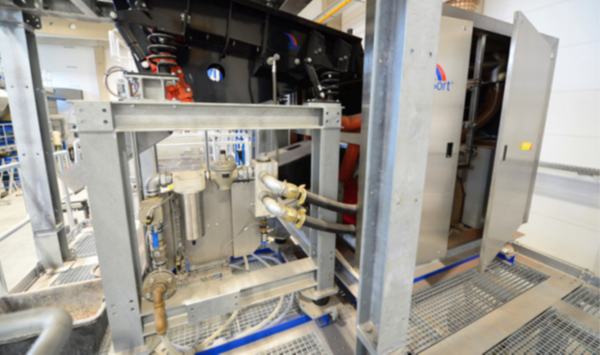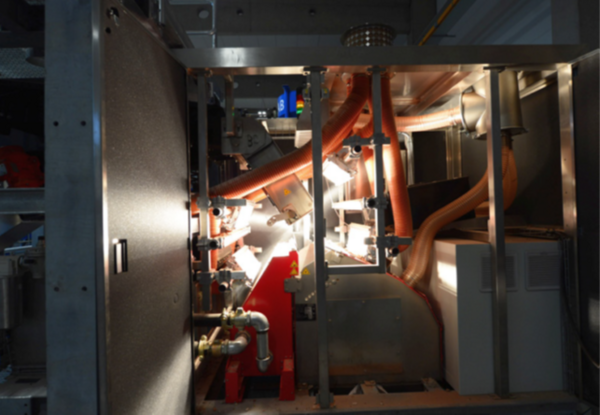LIBS-ConSort
LIBS-ConSort - Innovative sorting processes for construction and demolition waste
Resource-efficient circular economy - construction and mineral material cycles (ReMin)
The increasing diversity of materials in the construction industry is presenting the construction materials recycling industry with ever greater problems. Problems that can be solved through the use of innovative sorting processes for improved material recovery. The LIBS-ConSort project will discuss how these can be established in predominantly small and medium-sized construction materials recycling companies.
The project is being funded as part of the "Resource-efficient circular economy - construction and mineral material cycles (ReMin)" funding measure. "ReMin" is part of the BMBF research concept "Resource-efficient circular economy" and is aimed at resource-efficient construction and the expanded use of mineral secondary raw materials from construction waste, slag, ash and mining residues.
Increasing material diversity requires solutions
One problem in the construction industry is the increasing variety of materials. In the medium to long term, this will lead to a greater heterogeneity of mineral construction and demolition waste. In traditional masonry construction, for example, various main building materials (e.g. concrete, bricks or sand-lime bricks) are combined with other secondary building materials to create functional all-rounders. However, some of these secondary building materials form so-called foreign and impurities during further processing and recycling. These can make further recycling in closed material cycles more difficult. A well-known example is the gypsum plaster applied to masonry or the thermal insulation material integrated into vertically perforated bricks, which can only be uncovered after demolition.
Small and medium-sized building materials recycling companies are increasingly reaching their limits with selective demolition measures and conventional processing methods. The legitimate question is therefore: How can conventional demolition measures be combined with innovative processing technologies and how can conventional processing methods be expanded or even replaced? The primary objective here remains the recovery of unmixed material fractions for closed material cycles.
Innovative sorting processes as a key component
In this context, innovative sorting processes are the key component for improved recovery of recyclable materials. Ideally, the manual separation of solid mixtures (picking) practiced to date should be supplemented by automated sorting.

The research project is therefore based on the development of a new sorting technology using laser-induced breakdown spectroscopy (LIBS). This technology is to be tested with the help of a demonstrator. Sorting focuses on the processing of mixed construction waste and construction site waste as well as hazardous construction and demolition waste. For this purpose, various foreign and impurities are to be separated from the main construction materials and sent for separate processing.
The differentiated recycling and sales options are examined taking environmental aspects into account. In this way, the most holistic approach possible - closing short and long-term material cycles in the construction industry - can be pursued.
The predominantly small and medium-sized construction materials recycling companies should be able to use these new processing technologies - linked together within a technological chain - to recover unmixed material mixtures from construction and demolition waste for closed-loop recycling. Corresponding recycling options are also currently being examined for RC sand.
As the majority of the project partners are based in Berlin-Brandenburg, a value chain can be investigated regionally with regard to optimal material cycles.
The project is supported by associated partners and decision-makers such as the Berlin Senate Department for the Environment, Transport and Climate Protection and the German Demolition Association.
The project also contributes to the implementation of the Zero Waste Strategy of Berlin's circular economy.

Funding measure
Resource-efficient circular economy - construction and mineral material cycles (ReMin)
Project title
LIBS-ConSort - Laser-based building material sorting for the processing of construction and demolition waste for the circular economy
Duration
01.02.2021-31.01.2024
Funding reference
033R259
Funding volume of the consortium
2,772,649 euros
Contact
Mirko Landmann
IAB-Institut für Angewandte Bauforschung
Weimar gGmbH
Über der Nonnenwiese 1 | 99428 Weimar
Phone: 03643 8684-140
Email: m.landmann@iab-weimar.de
Project participants
BTB Recyclinghof GmbH; Federal Institute for Materials Research and Testing; Technical University of Berlin; SECOPTA Analytics GmbH; T.B.R. Teltower Baustoffrecycling GmbH; Gramm Fertigungstechnik GmbH
Data sheet
Download data sheet